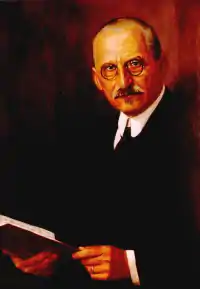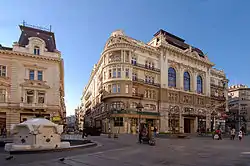Bogdan Gavrilović
Bogdan Gavrilović (Serbian Cyrillic: Богдан Гавриловић) (1864–1947) was a Serbian mathematician, physicist, philosopher, and educator. He received his doctorate in sciences mathematiques from the University of Budapest in 1887. He served twice as the Rector of the University of Belgrade and was elected three times as president of the Serbian Royal Academy (1931-1937).
Bogdan Gavrilović | |
|---|---|
 | |
| Born | 1864 |
| Died | 1947 Belgrade, FPR Yugoslavia |
| Nationality | Serbian |
| Scientific career | |
| Fields | Mathematics, Physics and Philosophy |
Biography
Bogdan Gavrilović was born in Novi Sad on 1 January 1864, to Sofija and Alexander Gavrilović. His grandfather was a teacher and a principal of the grammar school he attended and his father was a professor and director of the Lycée in the town he was born. He spent six years at the Lycée (secondary school, based on the French lycées) and during this time he proved to be one of the top students in every subject he studied. With such sound academic grounding and being an excellent student, he received the Sava Tekelija scholarship to study in Budapest. There at the Tekelianum (a Serbian educational institution), he studied at the University of Budapest, where he obtained his doctor's degree in mathematics in 1887. After graduation, he aimed to bring these subjects into general teaching practice, and at the same time initiated a wide-ranging reform of teacher education in Serbia. That same year he was appointed professor at the Grande école in Belgrade (which in 1905 became the University of Belgrade).
He lived in Belgrade until his death in 1947, active as a university professor up until Yugoslavia was invaded by Nazi Germany in 1941. Before the turn of the century he had published two voluminous university textbooks—900-page "Analytical Geometry" (1896), and "Theory of Determinants" (1899) on Linear algebra. Both works may be considered as capital works in mathematics in Serbia. Academician Radivoj Kašanin once wrote:
"Both, especially the latter (Theory of Determinants), would do honor to any nation, and many countries, at that time more powerful and luckier than ours, could not boast of such works".
For a whole decade at the beginning of the 20th century Bogdan Gavrilović was busy mostly with scientific subjects, publishing a score of excellent treatises, mainly in the periodical Glas, the official organ of the Serbian Academy of Sciences and Arts (SANU), and Rad of the Yugoslav Academy of Sciences and Arts in Zagreb. His interest was in the fields of algebra (theory of numbers and Linear algebra), analytical geometry and theory of functions. He was elected member of the Serbian Academy of Sciences in 1901 and of the Yugoslav Academy of Sciences in 1906. He later expanded into the foundations of mathematics.
Professor Gavrilović was an excellent organizer of scientific work at the Belgrade University and in the Academy. He made a great contribution to the universal acclamation of Belgrade's Grande école into the University of Belgrade, evidenced in his writings ("Spomenica o otvaranju Univerziteta", 1906). He subsequently became its rector, raised teaching levels and initiated the university's development. Also, he was three consecutive times (1931-1937) elected president of the Serbian Royal Academy. In 1894 he founded the mathematical library of the Department of Mathematics which was unfortunately destroyed near the end of the Second World War. With Mihailo Petrović Alas, Milutin Milanković and Dimitrije Nešić, he is credited for introducing modern mathematics in Serbia at the beginning of the 20th century.
Gavrilović held many important scientific and social functions and received numerous high honors. In addition, he was a member of Circolo matematico di Palermo, doctor honoris causa of the University of Athens, president of the Nikola Tesla Society, and director of The Nikola Tesla Institute. He was also one of the founders of the Mathematical Institute in Belgrade (1946). He wrote a philosophical work in 1926 entitled "Kultura i Harmonija" (Culture and Harmony). His view was that mathematics was valued in its connection with philosophy as well as with experimental sciences. Both Bogdan Gavrilović and Mihailo Petrović Alas were credited for encouraging Milutin Milanković to leave his post in Vienna and come to Belgrade.
His son, Stoyan Gavrilović, born in Belgrade in 1896, was Assistant Secretary of State in the Royal Yugoslav Government.
Selected works
- Analitična geometrija tačke, prave, kruga i koničnih preseka I-II, 1896.
- Teorija determinanata, 1899.
See also
References
Translated from Serbian to English: Bogdan Gavrilović
External links
| Academic offices | ||
|---|---|---|
| Preceded by Sava Urošević |
Rector of University of Belgrade 1910–1913 |
Succeeded by Slobodan Jovanović |
| Preceded by Slobodan Jovanović |
Rector of University of Belgrade 1920–1921 |
Succeeded by Pavle Popović |
| Preceded by Slobodan Jovanović |
President of Serbian Academy of Sciences and Arts 1931–1937 |
Succeeded by Aleksandar Belić |
